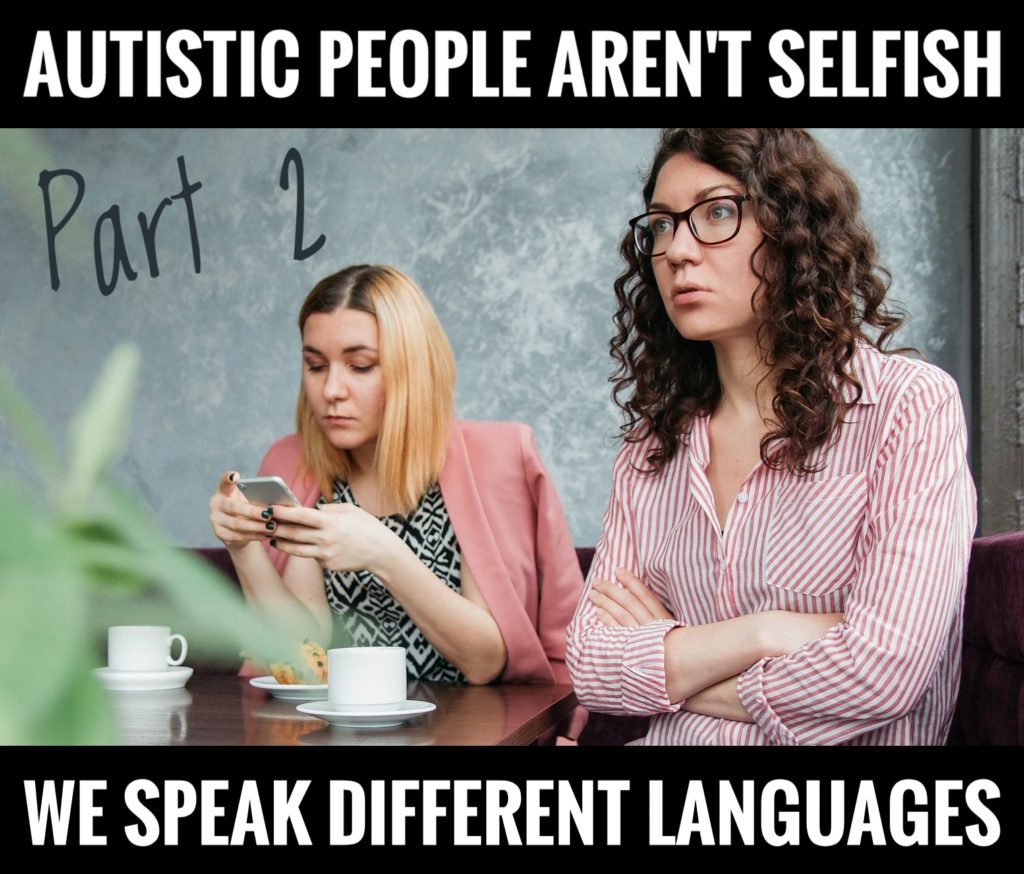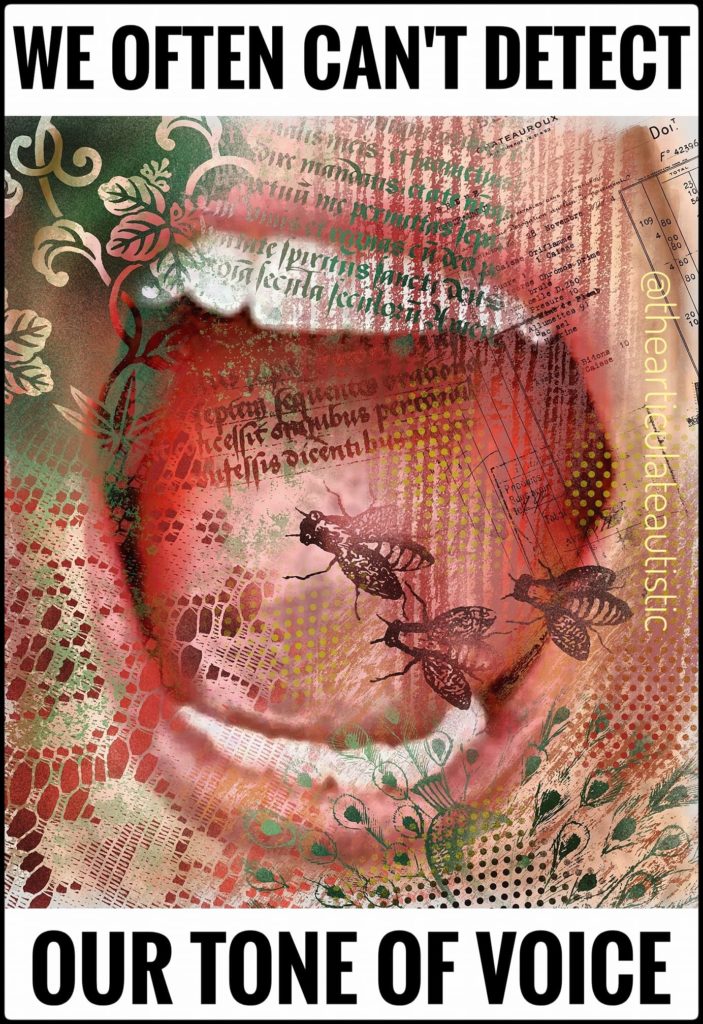Reasons You (Mistakenly) Believe Autistic People Are Selfish – Part 2 – Survival Mode

In part 1 of this two-part article, I mentioned common autistic traits that make neurotypical people mistakenly believe that autistic people are selfish. (If you haven’t read that one, I strongly encourage you to read it first, so you can get the full picture of why this misunderstanding happens so often.)
Even though I provided a lot of information and explanations for each common misconception in that first article, there is a common thread that ties them all together that I haven’t seen a lot of people write about, and that common thread is survival mode.
Another reason autistic people appear selfish and uncaring to the neurotypical people around us is that we are always in survival mode.
So, What Does That Mean?
Not only do autistic and neurotypical people speak two different neurological languages which cause us to misunderstand each other, both neurotypes also experience and process the world in two different ways, which influences our behavior and the way we interact with one another.
When I say autistic people live in survival mode, I’m not exaggerating. Living every day in a world that was not made for our neurology is traumatic, full stop.
A neurotypical person and an autistic person can be in the same surroundings with the same people in the same situations, and yet they often both have greatly differing and often contradictory experiences.
Let me give you an example:
Katie and Don are out for a drink on a Friday night. Katie is neurotypical, Don is autistic, both of them are in their mid-twenties. Katie is a hairdresser who works with people all day, while Don is a tech support person who works from the quiet and comfort of home. Although they are just friends, Katie is developing a crush on Don, but she isn’t sure how to tell him.

This scene starts with her walking into the bar, which is quiet for now because it’s early in the evening.
Katie (wearing a new dress, hair done, makeup applied): “Hi, Don. How are you?”
Don (smiles and nods, watching Katie sit down): “Good. How are you?” (As he says this scripted greeting, he cocks his head to one side and squints his eyes—he notices something different about his friend, but he can’t figure out what it is.)
Katie (laughing nervously as Don stares): “Is there something in my teeth?”
Don (looking at Katie’s teeth): “No. You just look different.”
Katie (perks up, thinking that Don is noticing the effort she put into her appearance and what this means): “Different good or different bad?” Her voice raises an octave, and she dips her head downward, her eyes looking up to his in a coy expression.
Don: “Just different.”
Katie (crestfallen and hurt): “Oh. I see.”
Don (sensing something isn’t quite right but unsure of what it is): “I’m just used to seeing you in a T-shirt and jeans, that’s all. I almost didn’t recognize you.”
Katie (raising an eyebrow, not sure what to make of this): “Oh. OK.”
Don is still a bit confused about his friend’s change in behavior and style of dress, but he moves the conversation forward, they get a drink, and they continue talking.
As time goes by, the weekend crowd starts filing in to the bar. What was once a steady thrum of noise just an hour ago is now a cacophony. Not only are people talking, laughing, clinking glasses, and eating, the TV is also on, the music is blaring, and every pool table is full, the players each smacking the balls around loudly.
For Katie, this is the noise of a bar on a Friday night. She’s focused on Don, her drink, and their space. She can hear the noises around them, but her neurotypical brain can filter out and ignore what it doesn’t need to pay attention to while zeroing in on their conversation.
For Don, this environment is becoming a sensory nightmare, and he’s realizing for the first time that it’s Friday night. (The fact that he works from home coupled with his autistic perception of time made him overlook this crucial fact when he agreed to meet Katie at a bar, and now it’s too late.)
Suddenly, Katie is taking him by the hand and leading him to the small dance floor past the pool tables. In addition to the noises, Don’s eyes are now being assaulted by multicolored strobe lights.

As Katie dances with Don and tries to talk to him, leaning close and whispering in his ear, she notices that he seems distracted, stiff, and uninterested. He keeps looking away from her and at the rest of the people in the bar. Although she feels ignored, she’s had a few drinks and is feeling frisky, so she goes for it anyway.
Katie: “Wanna get out of here?” (She’s using a line to say she wants to go back to her or his place and have sex.)
Don (suddenly perking up): “Dear God, yes!”
Katie (turned on and amused by his sudden and enthusiastic interest): “Well, OK, then!”
Katie leads Don by the hand out the back door, and they begin heading to their cars.
Don: “Wow. It was so loud in there. Thank you for understanding and getting us out of there. My head is pounding. I’m going to go home and rest. Talk soon?”
Katie stands in the parking lot in open-mouthed shock as Don gets into his car, waves, and drives away. Hurt, confused, and angry, Katie gets into her car, goes home, blocks his number, and never talks to Don again.
What’s Happening for an Autistic Person When Neurotypical People Get Upset About What Seems “Trivial”
OK, so now that I’ve done all that preamble, I want to get down to the point of this article: The seeming triviality of neurotypical needs.
Now, hold on!
I’m not saying neurotypical needs ARE trivial, I’m saying I want to help NT people understand what autistic people experience and why we react the way we do to certain things. This social disconnect is one of the primary reasons neurotypical people get the mistaken impression that autistic people do not care about the feelings of others, and addressing this is critically important if we are to move forward and have more effective communication.
Remember how Katie and Don were in the same place at the same time and still had two totally different experiences? Katie was calm and comfortable in the setting, and Don was being slowly tortured by an influx of sensory information?
OK, now, let’s apply this to everyday interactions. Imagine that your autistic loved one is Don and you’re Katie. No matter what the dynamic is between you, just imagine the large difference in experience between the two neurotypes.
Say you’re a neurotypical parent and your neurodivergent child talks to you in what you perceive to be a rude tone out of nowhere. To you, everything is fine. The house is quiet, everybody is fed, there have been no arguments, your child is wearing comfortable clothes and is playing with his favorite fidget cube. There should be no reason for him to talk to you in a rude tone, so you conclude it MUST have been done out of purposeful spite.
To your child, however, the heat has been turned up a couple of degrees higher than he’s used to (which he can feel quite plainly even if you can’t), there is a humming in the overhead florescent light above the kitchen sink, and it’s blinking erratically every 3 minutes, the upstairs neighbor has yet to change her smoke detector battery, and it’s been beeping steadily for days now (and your son does NOT understand how everyone else is the house isn’t pulling their hair out in frustration from the noise).
Bombarded by all of these sensory assaults, your son still smiles, speaks to you in a calm tone like he’s been taught in ABA, fidgets with his cube, forces his legs to not swing even though that’s what eases his anxiety the most, and reminds himself to nod and make listening noises at the appropriate intervals when you speak to him.
Then, there’s a smell. All of a sudden, out of nowhere, the rotten smell of garbage meets his nose, and it’s one more type of sensory overload to add to the mixture he’s already fighting so hard to pretend he’s not experiencing. His mask slips for a second and his vocal tone changes back to his comfortable, natural, autistic monotone for just a moment, and BAM, he is swiftly and immediately reprimanded for being rude.
Rude. That’s it. Not for screaming and hitting (which he’s done in the past out of sheer frustration of not being understood) or for shattering a stack of dishes (which he accidentally did a couple of years ago because he smacked into a table with his body while running because many autistic people have poor proprioception), but for having a perceived tone.
For an autistic person, being reprimanded for having a “tone” (or something equally as minimally damaging to others around us) is the equivalent of running out the bathroom during a house fire to save your own life only to be yelled at for not washing your hands.
The Takeaway
Autistic people are a house on fire every single day, yet we are still expected to conform to neurotypical social situations while fighting every instinct inside of us that tells us to run, freeze, fawn, or fight to save our lives.
When an NT person gets upset with us for the social equivalent of “not washing our hands”, it is WE who wonder if our neurotypical loved ones care about US.
When it comes to communicating more effectively with the autistic person in your life, keep in mind that although we may be sharing the same space and situation, we are NOT having the same experience.
Furthermore, if your autistic loved one is in ABA or some other type of “therapy” attempting to change how we naturally respond to being on fire all the time, this will eventually lead to mistrust of others, resentment, severe anxiety, agoraphobia, OCD, PTSD, and more.
So, pick your battles wisely, and don’t try to change who we are. Instead, support us by learning from actually autistic adults who wear the battle scars so that your autistic loved one doesn’t EVER have to go through what we did (because many of us didn’t even survive to tell you about it).
Follow me on Instagram.
Want downloadable, PDF-format copies of these blog posts to print and use with your loved ones or small class? Click here to become a Patreon supporter!






Don’t you think it’s pretty ignorant and offensive to pretend to know what “neurotypical” people are thinking and feeling?
No, not at all, and I’ll tell you why. First, I don’t think I know exactly what neurotypical people are thinking and feeling. That’s up to the individual person. However, I can tell you that autistic people are especially adept at recognizing patterns of behavior. I, like many autistic people, have had to carefully study neurotypical behavior in order to remain relatively safe by anticipating their reactions to my natural autistic behavior. Since NT and ND people are wired SO differently, it can be very easy for us to unintentionally offend and upset each other. Also, I’ve studied psychology and human behavior because, again, I’ve had to to survive in a world not made for my neurology. I don’t think I know everything, and if I’m ever wrong about the way I perceive and explain neurotypical behavior, I have no problem with a neurotypical person telling me differently. If it’s not your experience, it’s not your experience. That’s fair and valid.
NDs don’t think they know what NTs are thinking and feeling, it’s that we’re so accustomed to catering to NTs that we develop a high sensitivity to the things they want and need. The misconception we’re dealing with, in reconciling our differences, is understanding that just because one form of behavior is normal (in that it occurs more often) does not necessarily mean it is the best, or ideal way to behave. Many NDs are taught that; this article strives to illustrate that there is another experience out there, and that it too can be “ideal” or “best” to another person.
I feel like the most prominent thing ASD teaches you is that there are many different valid perspectives in life, because most of an NDs life is spent not having their perspective appreciated. So, they spend all of their time catering to and understanding NTs. If you spent as much time studying NDs as much as NDs spend studying NTs yo uwould probably be pretty good at understanding what they experience.
And you have just proven the premise of the article. The neuro diverse person on average, has to spend an immense amount of energy trying to work out what neurotypical people are thinking, doing or really mean, while adapting out body language and responses as best we can to avoid causing offence and having our heads ripped off.
I’m not entirely sure how to guarantee that Shannon receives this message, but my reply is directed at you, dear Shannon. NDs don’t think they know what NTs are thinking and feeling, it’s that we’re so accustomed to catering to NTs that we develop a high sensitivity to the things they want and need. The misconception we’re dealing with, in reconciling our differences, is understanding that just because one form of behavior is normal (in that it occurs more often) does not necessarily mean it is the best, or ideal way to behave. Many NDs are taught that; this article strives to illustrate that there is another experience out there, and that it too can be “ideal” or “best” to another person.
I feel like the most prominent thing ASD teaches you is that there are many different valid perspectives in life, because most of an NDs life is spent not having their perspective appreciated. So, they spend all of their time catering to and understanding NTs. If you spent as much time studying NDs as much as NDs spend studying NTs yo uwould probably be pretty good at understanding what they experience.
Hello! I think this article is eyes opener for me! Lately, my counselor suspected that I may have some mild or level 1 autism in me. My husband was surprised of her diagnsis then he agreed with her but I disagreed. However, when I read your article, this one. Wow, I see so much in common! My husband thinks I was thinking of myself or being selfish when it was not true. I want to say thank you for this article and I look forward to read more info from your website and books you recommend to read! Thanks again!
Hello, Liz. I’m so happy to have helped. 🙂 I offer one-on-one and family consultations if you and your husband want to discuss your communication differences more in-depth.
Here’s the link: https://www.thearticulateautistic.com/private-consultation-translation-autistic-adult/
You know what could be really helpful for nt’s, is for autistics to own behaviors that are not ok. I would love to know how to live with extreme selfishness, conniving, passive aggression, when an adult knows their off the charts selfishness is not ok. They know they are being selfish, but they want to get by with and so they practice ignoring and carry on. Most of these sites go into defense mode and don’t own the behavior, so we who are not high functioning autistic get no help trying to navigate this problem. How in the world can this be addressed when thier is always an excuse?
No, not at all. I don’t think you’re understanding this as a disability. You’re still seeing it as a purposeful choice on the part of the autistic person. If someone couldn’t see without glasses, you wouldn’t tell them they weren’t trying hard enough to see. That wouldn’t make sense. But because it’s impossible to physically see the differences in brain function just by looking at an autistic person, it still looks as though it’s a behavioral issue. It isn’t. It’s a disability. The things that make autistic people appear selfish are not actually intentional selfishness, which is why I break down each of the reasons it appears that way individually. If you still believe, after doing more research, that autistic people are purposefully messing with you, then you’ll always be disappointed and hurt and you’ll confuse and traumatize the autistic people in your life by reacting to them in ways they don’t understand. These types of communication barriers do have workarounds, but you have to at least meet us halfway by believing us when we say what our intentions truly are versus how they appear to be.
Thanks for this example situation, I have some questions regarding this, that could help me better understand the scene:
Don and Katy apparently know each other, and have agreed to meet a that place.
I suspect that Don knows he’s ND ? or does he simply know he’s having issues with social situations ?
Assuming he does know his ND state, did he inform Katie about this in advance, or did he not do so in order to no appear as ‘somewhat strange’ [my emphasis], i.e. he is masking to fit in ?
It could be that Katie was informed by him, but had no prior experience with NDs, so she not sure what to expect.
Does Don know about the sensory risks he could possibly face, this being a cafe at the end of week with people having a drink and being noisy ?
Or is he simply ignorant of the risks due to little experience with such places?
I think this could be a good learning experience for both Don and Katie.
Don learns about these places, and the importance of communicating his troubles with others that may have trouble understanding this behaviour.
Katie learns something about ND behaviour.
How do you help an autistic person deal with these stressors in a way that doesn’t damage relationships and hurt other people? My son is very “selfish” – meaning he puts his own wants and needs before others, including trying to control what songs we listen to, what food we eat, if his father or I ever leave the house, what we laugh at, what animals we are allowed to like, and so on – and if things don’t go his way he gets very upset and deliberately cruel. He says terrible things and kicks or hits. I understand that this is rooted in anxiety, that he wants his world and the people in it to be predictable and therefore feel “safe,” but I should be able to laugh at a joke I find funny or smile at a dog (he ONLY likes cats) without him falling apart and lashing out at me. We work on identifying the things he CAN control, and coping with the other stuff, but it’s almost like he’d rather be angry and upset over these things because then he’s justified in feeling angry at us, and then he “wins.” If he copes and feels better, he “loses” in his mind. We have had therapy (not ABA) to work on coping skills, and at first it was helpful, but the teenage years are proving rough indeed.
Hello, Lizzy. It sounds like you’re really struggling! I’m so sorry. Does your son have a PDA profile (pathological demand avoidance or persistent demand for autonomy)? Do you know what his sensory profile is? Things that make him feel safe and comfortable, ways he prefers to stim, etc.? Getting to the root cause of the severe anxiety around anything changing or being different might help. Please feel free to email me directly at thearticulateautistic@gmail.com.
Thank you. You are very kind and helpful (more kind and helpful than a lot of sites about autism!). I don’t know about his PDA or sensory profiles are, which actually gives me something to work with here. His therapists haven’t done those profiles, but as his mom I can start looking into these things myself. I do know, generally, what makes him safe and calm and how he prefers to stim, but he often doesn’t listen to me when I try to help him calm himself. On some level he wants to feel justified in being upset and if he calms himself he’s “lost” the battle. He loves winning. I try to tell him that by feeling better he is *truly* winning but he doesn’t quite agree about that yet. Haha! But thank you for providing direction – I appreciate it so much.